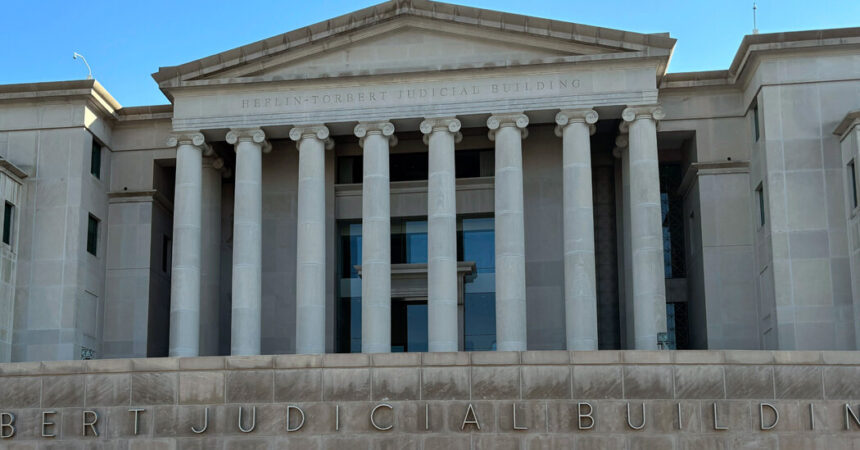An Alabama Supreme Courtroom’s ruling that frozen embryos in take a look at tubes must be thought-about kids has despatched shock waves via the world of reproductive medication, casting doubt over fertility take care of would-be mother and father within the state and elevating complicated authorized questions with implications extending far past Alabama.
On Tuesday, Karine Jean-Pierre, the White Home press secretary, mentioned the ruling would trigger “precisely the kind of chaos that we anticipated when the Supreme Courtroom overturned Roe v. Wade and paved the way in which for politicians to dictate a few of the most private selections households could make.”
Chatting with reporters aboard Air Drive One as President Biden traveled to California, Ms. Jean-Pierre reiterated the Biden administration’s name for Congress to codify the protections of Roe v. Wade into federal legislation.
“As a reminder, this is similar state whose lawyer basic threatened to prosecute individuals who assist ladies journey out of state to hunt the care they want,” she mentioned, referring to Alabama, which started imposing a complete abortion ban in June 2022.
The judges issued the ruling on Friday in appeals instances introduced by {couples} whose embryos had been destroyed in 2020, when a hospital affected person eliminated frozen embryos from tanks of liquid nitrogen in Cellular and dropped them on the ground.
Referencing antiabortion language within the state structure, the judges’ majority opinion mentioned that an 1872 statute permitting mother and father to sue over the wrongful dying of a minor youngster applies to “unborn kids,” with no exception for “extrauterine kids.”
“Even earlier than delivery, all human beings have the picture of God, and their lives can’t be destroyed with out effacing his glory,” Chief Justice Tom Parker wrote in a concurring opinion.
Infertility specialists and authorized consultants mentioned the ruling had probably profound results, which must be of concern to each American who might must entry reproductive providers like in vitro fertilization.
One in six households grapples with infertility, in response to Barbara Collura, the president and chief govt of Resolve, which represents the pursuits of infertility sufferers.
“You’ve modified the standing of a microscopic group of cells to now being an individual or a baby,” Ms. Collura mentioned. “They didn’t say in vitro fertilization is prohibited, and so they didn’t say that you would be able to’t freeze embryos. It’s even worse — there is no such thing as a highway map.”
It has turn into customary medical protocol throughout in vitro fertilization to extract as many eggs as potential from a lady, then to fertilize them to create embryos earlier than freezing them. Typically, just one embryo is transferred at a time into the uterus so as to maximize the possibilities of profitable implantation and a full-term being pregnant.
“However what if we will’t freeze them?” Ms. Collura requested. “Will we maintain individuals criminally liable as a result of you may’t freeze a ‘individual’? This opens up so many questions.”
Reproductive medication scientists additionally blasted the ruling, saying it was a “medically and scientifically unfounded resolution.”
“The court docket held {that a} fertilized frozen egg in a fertility clinic freezer must be handled because the authorized equal of an existent youngster or a fetus gestating in a womb,” mentioned Dr. Paula Amato, the president of the American Society for Reproductive Medication.
“Science and on a regular basis frequent sense inform us they aren’t,” she mentioned. Even within the pure world, she added, a number of eggs are sometimes fertilized earlier than one efficiently implants within the uterus and ends in a being pregnant.
Dr. Amato predicted that younger docs would cease going to Alabama to coach or to observe medication within the aftermath of the ruling, and that docs would shut fertility clinics within the state if working them meant working the danger of being introduced up on civil or legal prices.
“Fashionable fertility care will probably be unavailable to the individuals of Alabama,” Dr. Amato predicted.
{Couples} within the midst of grueling and expensive infertility therapies in Alabama mentioned they had been overwhelmed with questions and considerations, and a few mentioned they feared their suppliers could be pressured to shut their clinics.
Megan Legerski, 37, of Tuscaloosa, Ala., who’s presently present process infertility remedy, mentioned that she just lately turned pregnant after being implanted with an embryo created via in vitro fertilization, however that she miscarried after eight weeks.
She and her associate have three extra frozen embryos that they’ll implant, she mentioned.
“The embryos to me are our greatest probability at having kids, and we’re extraordinarily hopeful,” Ms. Legerski mentioned. “However having three embryos within the freezer shouldn’t be the identical to me as having one which implants and turn into a being pregnant, and it’s not the identical as having a baby.
“We now have three embryos. We don’t have three kids.”
Katie Rogers contributed reporting from Washington.
Audio produced by Jack D’Isidoro.





